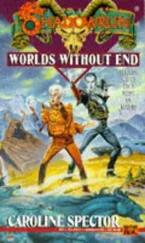“Of course.”
“Well, all right then.”
“Good. I’m glad that’s settled.” Philippa stood up.
But Ralph was not finished. “Now what about Roley? He could go too, so that they would be together.”
Philippa did not like this idea at all, Ralph could tell, but she was too clever to contradict him flatly. “Roley’s a bit young,” she said, as if thinking it over. “And he hasn’t properly learned his letters yet.”
“Letters aren’t as important to a nobleman as learning to fight. After all, he is second in line to the earldom. If anything should happen to Gerry…”
“Which God forbid.”
“Amen.”
“All the same, I think he should wait until he’s fourteen.”
“I don’t know. Roley’s always been a bit womanish. Sometimes he reminds me of my brother, Merthin.” He saw a flash of fear in her eyes. She was afraid of letting her baby go, he guessed. He was tempted to insist, just to torture her. But ten was young for a squire. “We’ll see,” he said noncommittally. “He’ll have to be toughened up sooner or later.”
“All in good time,” said Philippa.
*
The judge, Sir Lewis Abingdon, was not a local man, but a London lawyer from the king’s court, sent on tour to try serious cases in county-courts. He was a beefy type with a pink face and a fair beard. He was also ten years younger than Ralph.
Ralph told himself he should not be surprised. He was now forty-four. Half his own generation had been wiped out by the plague. Nevertheless, he continued to be startled by distinguished and powerful men who were younger than he.
They waited, with Gerry and Roley, in a side chamber at the Courthouse inn, while the jury assembled and the prisoners were brought down from the castle. It turned out that Sir Lewis had been at Crécy, as a young squire, though Ralph did not recall him. He treated Ralph with wary courtesy.
Ralph tried subtly to probe the judge and find out how tough he was. “The Statute of Labourers is difficult to enforce, we find,” he said. “When peasants see a way to make money, they lose all respect for the law.”
“For every runaway who is working for an illegal wage, there is an employer who is paying it,” the judge said.
“Exactly! The nuns of Kingsbridge Priory have never obeyed the statute.”
“Difficult to prosecute nuns.”
“I don’t see why.”
Sir Lewis changed the subject. “You have a special interest in this morning’s proceedings?” he asked. He had probably been told that it was unusual for Ralph to exercise his right to sit beside the judge.
“The murderer is a serf of mine,” Ralph admitted. “But the main reason I’m here is to give these boys a look at how justice works. One of them is likely to be the earl when I give up the ghost. They can watch the hangings tomorrow, too. The sooner they get used to seeing men die, the better.”
Lewis nodded agreement. “The sons of the nobility cannot afford to be soft-hearted.”
They heard the clerk of the court bang his gavel, and the hubbub from the next room died down. Ralph’s anxiety was not allayed: Sir Lewis’s conversation had not told him much. Perhaps that in itself was revealing: it might mean he was not easily influenced.
The judge opened the door and stood aside for the earl to go first.
At the near end of the room, two large wooden chairs were set on a dais. Next to them was a low bench. A murmur of interest arose from the crowd as Gerry and Roley sat on the bench. The people were always fascinated to see the children who would grow into their overlords. But more than that, Ralph thought, there was a look of innocence about the two prepubescent boys that was strikingly out of place in a court whose business was violence, theft and dishonesty. They looked like lambs in a pigpen.
Ralph sat in one of the two chairs and thought of the day, twenty-two years ago, when he had stood in this very courtroom as a criminal accused of rape – a ludicrous charge to bring against a lord when the so-called victim was one of his own serfs. Philippa had been behind that malicious prosecution. Well, he had made her suffer for it.
At that trial, Ralph had fought his way out of the room as soon as the jury pronounced him guilty, and then had been pardoned when he joined the king’s army and went to France. Sam was not going to escape: he had no weapon, and his ankles were chained. And the French wars seemed to have petered out, so there were no more free pardons.
Ralph studied Sam as the indictment was read. He had Wulfric’s build, not Gwenda’s: he was a tall lad, broad across the shoulders. He might have made a useful man-at-arms if he had been more nobly born. He did not really look like Wulfric, though something about the cast of his features rang a bell. Like so many accused men, he wore an expression of superficial defiance overlaying fear. That’s just how I felt, Ralph thought.
Nathan Reeve was the first witness. He was the father of the dead man but, more importantly, he testified that Sam was a serf of Earl Ralph’s and had not been given leave to go to Oldchurch. He said he had sent his son Jonno to follow Gwenda in the hope of tracking down the runaway. He was not likeable, but his grief was clearly genuine. Ralph was pleased: it was damning testimony.
Sam’s mother was standing next to him, the top of her head level with her son’s shoulder. Gwenda was not beautiful: her dark eyes were set close to a beaky nose, and her forehead and chin both receded sharply, giving her the look of a determined rodent. Yet there was something strongly sexual about her, even in middle age. It was more than twenty years since Ralph had lain with her, but he remembered her as if it were yesterday. They had done it in a room at the Bell in Kingsbridge, and he had made her kneel up on the bed. He could picture it now, and the memory of her compact body excited him. She had a lot of dark hair, he recollected.
Suddenly she met his eye. She held his gaze and seemed to sense what he was thinking. On that bed she had been indifferent and motionless, to begin with, accepting his thrusts passively because he had coerced her; but, at the end, something strange had come over her, and almost against her own will she had moved in rhythm with him. She must have remembered the same thing, for an expression of shame came over her plain face, and she looked quickly away.
Next to her was another young man, presumably the second son. This one was more like her, small and wiry, with a crafty look about him. He met Ralph’s gaze with a stare of intense concentration, as if he was curious what went on in the mind of an earl, and thought he might find the answer in Ralph’s face.
But Ralph was most interested in the father. He had hated Wulfric since their fight at the Fleece Fair of 1337. He touched his broken nose reflexively. Several other men had wounded him in later years, but none had hurt his pride so badly. However, Ralph’s revenge on Wulfric had been terrible. I deprived him of his birthright for a decade, Ralph thought. I lay with his wife. I gave him that scar across his cheek when he tried to stop me escaping from this very courtroom. I dragged him home when he tried to run away. And now I’m going to hang his son.
Wulfric was heavier than he used to be, but he carried it well. He had a salt-and-pepper beard that did not grow over the long scar of the sword wound Ralph had given him. His face was lined and weatherbeaten. Where Gwenda looked angry, Wulfric was grief-stricken. As the peasants of Oldchurch testified that Sam had killed Jonno with an oak spade, Gwenda’s eyes flashed defiance, whereas Wulfric’s broad forehead creased in anguish.
The foreman of the jury asked whether Sam had been in fear for his life.
Читать дальше












